Leadership and Management: Iceland Supermarket Case Study Analysis
VerifiedAdded on 2020/01/23
|15
|5121
|167
Report
AI Summary
This report provides a comprehensive analysis of leadership and management, focusing on the distinct roles and characteristics of leaders and managers within an organizational context. It delves into the comparison of leadership and management roles across different business scenarios, particularly within the retail sector, using Iceland supermarket as a case study. The report examines the application of various leadership theories and models, including the contingency model, situational leadership, and transactional and transformational leadership, highlighting their strengths and weaknesses. It also differentiates between the functions of leaders and managers, supported by the application of management by objectives, classical management theory, and transactional and transformational leadership. Furthermore, the report explores key approaches to operations management, the significance of operational management in meeting objectives, factors impacting operational management, and ways to enhance efficiency. The study concludes with an evaluation of managing operations and its affecting factors, providing a well-rounded overview of leadership, management, and operational strategies.
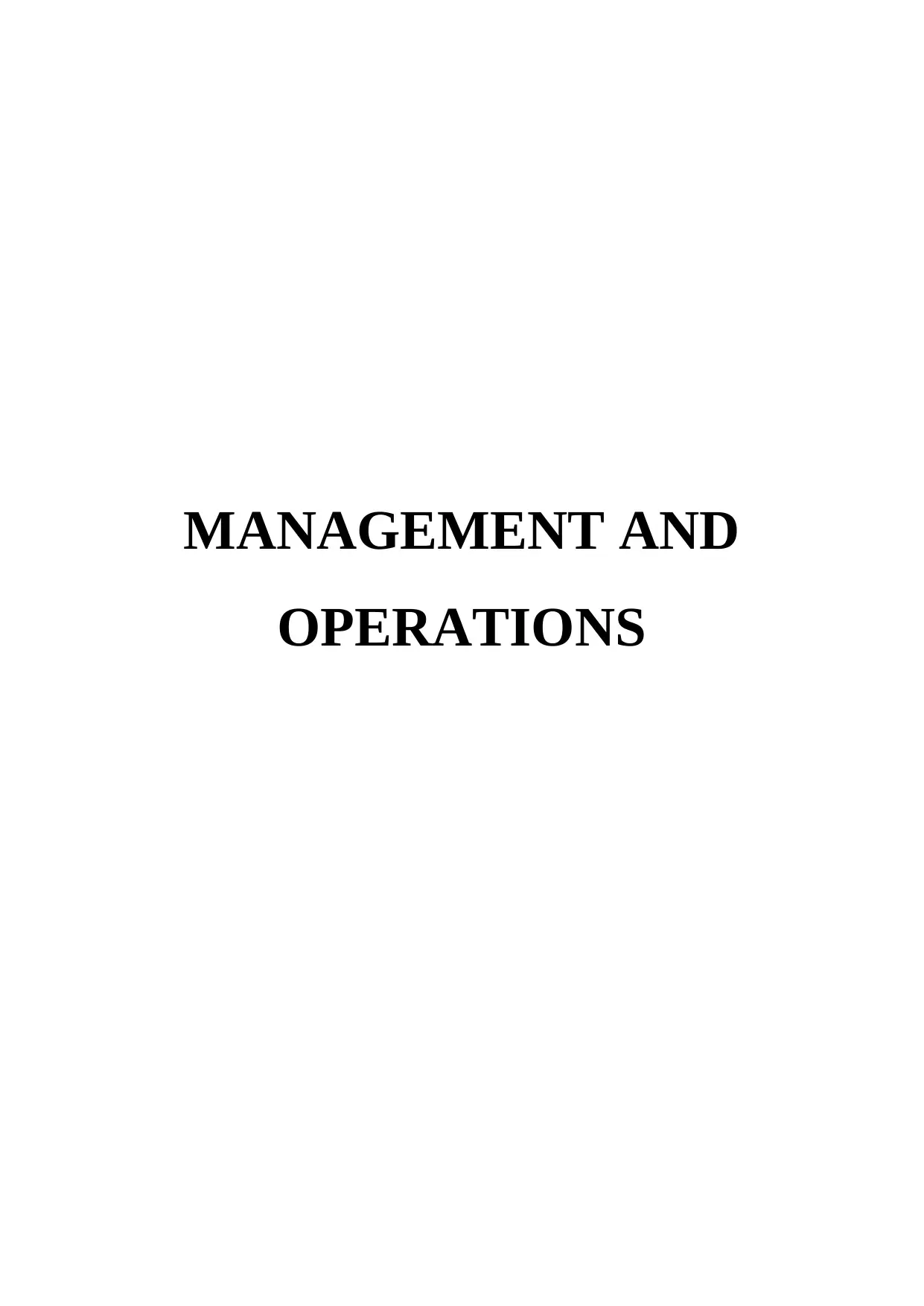
MANAGEMENT AND
OPERATIONS
OPERATIONS
Paraphrase This Document
Need a fresh take? Get an instant paraphrase of this document with our AI Paraphraser
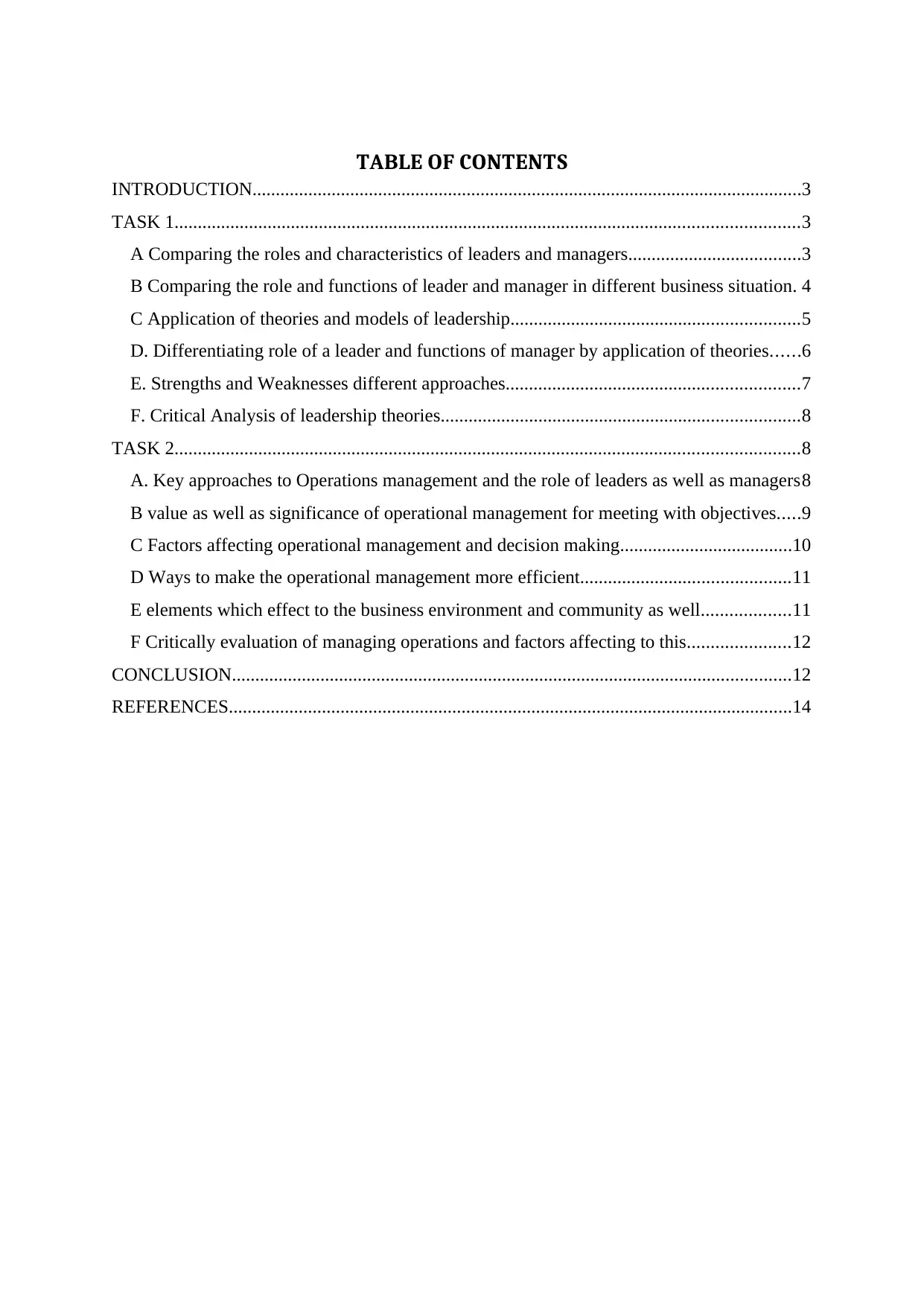
TABLE OF CONTENTS
INTRODUCTION......................................................................................................................3
TASK 1......................................................................................................................................3
A Comparing the roles and characteristics of leaders and managers.....................................3
B Comparing the role and functions of leader and manager in different business situation. 4
C Application of theories and models of leadership..............................................................5
D. Differentiating role of a leader and functions of manager by application of theories......6
E. Strengths and Weaknesses different approaches...............................................................7
F. Critical Analysis of leadership theories.............................................................................8
TASK 2......................................................................................................................................8
A. Key approaches to Operations management and the role of leaders as well as managers8
B value as well as significance of operational management for meeting with objectives.....9
C Factors affecting operational management and decision making.....................................10
D Ways to make the operational management more efficient.............................................11
E elements which effect to the business environment and community as well...................11
F Critically evaluation of managing operations and factors affecting to this......................12
CONCLUSION........................................................................................................................12
REFERENCES.........................................................................................................................14
INTRODUCTION......................................................................................................................3
TASK 1......................................................................................................................................3
A Comparing the roles and characteristics of leaders and managers.....................................3
B Comparing the role and functions of leader and manager in different business situation. 4
C Application of theories and models of leadership..............................................................5
D. Differentiating role of a leader and functions of manager by application of theories......6
E. Strengths and Weaknesses different approaches...............................................................7
F. Critical Analysis of leadership theories.............................................................................8
TASK 2......................................................................................................................................8
A. Key approaches to Operations management and the role of leaders as well as managers8
B value as well as significance of operational management for meeting with objectives.....9
C Factors affecting operational management and decision making.....................................10
D Ways to make the operational management more efficient.............................................11
E elements which effect to the business environment and community as well...................11
F Critically evaluation of managing operations and factors affecting to this......................12
CONCLUSION........................................................................................................................12
REFERENCES.........................................................................................................................14
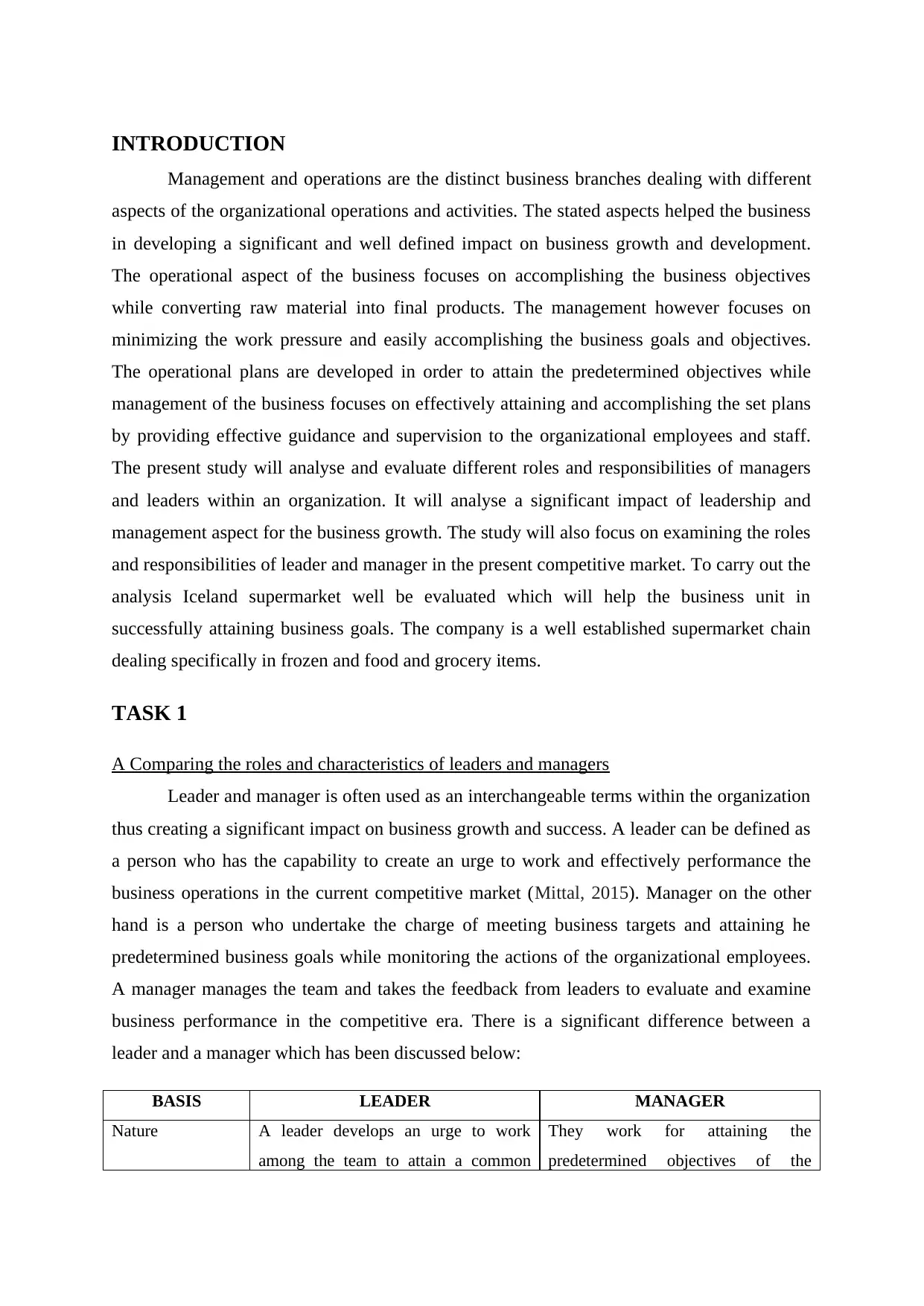
INTRODUCTION
Management and operations are the distinct business branches dealing with different
aspects of the organizational operations and activities. The stated aspects helped the business
in developing a significant and well defined impact on business growth and development.
The operational aspect of the business focuses on accomplishing the business objectives
while converting raw material into final products. The management however focuses on
minimizing the work pressure and easily accomplishing the business goals and objectives.
The operational plans are developed in order to attain the predetermined objectives while
management of the business focuses on effectively attaining and accomplishing the set plans
by providing effective guidance and supervision to the organizational employees and staff.
The present study will analyse and evaluate different roles and responsibilities of managers
and leaders within an organization. It will analyse a significant impact of leadership and
management aspect for the business growth. The study will also focus on examining the roles
and responsibilities of leader and manager in the present competitive market. To carry out the
analysis Iceland supermarket well be evaluated which will help the business unit in
successfully attaining business goals. The company is a well established supermarket chain
dealing specifically in frozen and food and grocery items.
TASK 1
A Comparing the roles and characteristics of leaders and managers
Leader and manager is often used as an interchangeable terms within the organization
thus creating a significant impact on business growth and success. A leader can be defined as
a person who has the capability to create an urge to work and effectively performance the
business operations in the current competitive market (Mittal, 2015). Manager on the other
hand is a person who undertake the charge of meeting business targets and attaining he
predetermined business goals while monitoring the actions of the organizational employees.
A manager manages the team and takes the feedback from leaders to evaluate and examine
business performance in the competitive era. There is a significant difference between a
leader and a manager which has been discussed below:
BASIS LEADER MANAGER
Nature A leader develops an urge to work
among the team to attain a common
They work for attaining the
predetermined objectives of the
Management and operations are the distinct business branches dealing with different
aspects of the organizational operations and activities. The stated aspects helped the business
in developing a significant and well defined impact on business growth and development.
The operational aspect of the business focuses on accomplishing the business objectives
while converting raw material into final products. The management however focuses on
minimizing the work pressure and easily accomplishing the business goals and objectives.
The operational plans are developed in order to attain the predetermined objectives while
management of the business focuses on effectively attaining and accomplishing the set plans
by providing effective guidance and supervision to the organizational employees and staff.
The present study will analyse and evaluate different roles and responsibilities of managers
and leaders within an organization. It will analyse a significant impact of leadership and
management aspect for the business growth. The study will also focus on examining the roles
and responsibilities of leader and manager in the present competitive market. To carry out the
analysis Iceland supermarket well be evaluated which will help the business unit in
successfully attaining business goals. The company is a well established supermarket chain
dealing specifically in frozen and food and grocery items.
TASK 1
A Comparing the roles and characteristics of leaders and managers
Leader and manager is often used as an interchangeable terms within the organization
thus creating a significant impact on business growth and success. A leader can be defined as
a person who has the capability to create an urge to work and effectively performance the
business operations in the current competitive market (Mittal, 2015). Manager on the other
hand is a person who undertake the charge of meeting business targets and attaining he
predetermined business goals while monitoring the actions of the organizational employees.
A manager manages the team and takes the feedback from leaders to evaluate and examine
business performance in the competitive era. There is a significant difference between a
leader and a manager which has been discussed below:
BASIS LEADER MANAGER
Nature A leader develops an urge to work
among the team to attain a common
They work for attaining the
predetermined objectives of the
⊘ This is a preview!⊘
Do you want full access?
Subscribe today to unlock all pages.

Trusted by 1+ million students worldwide
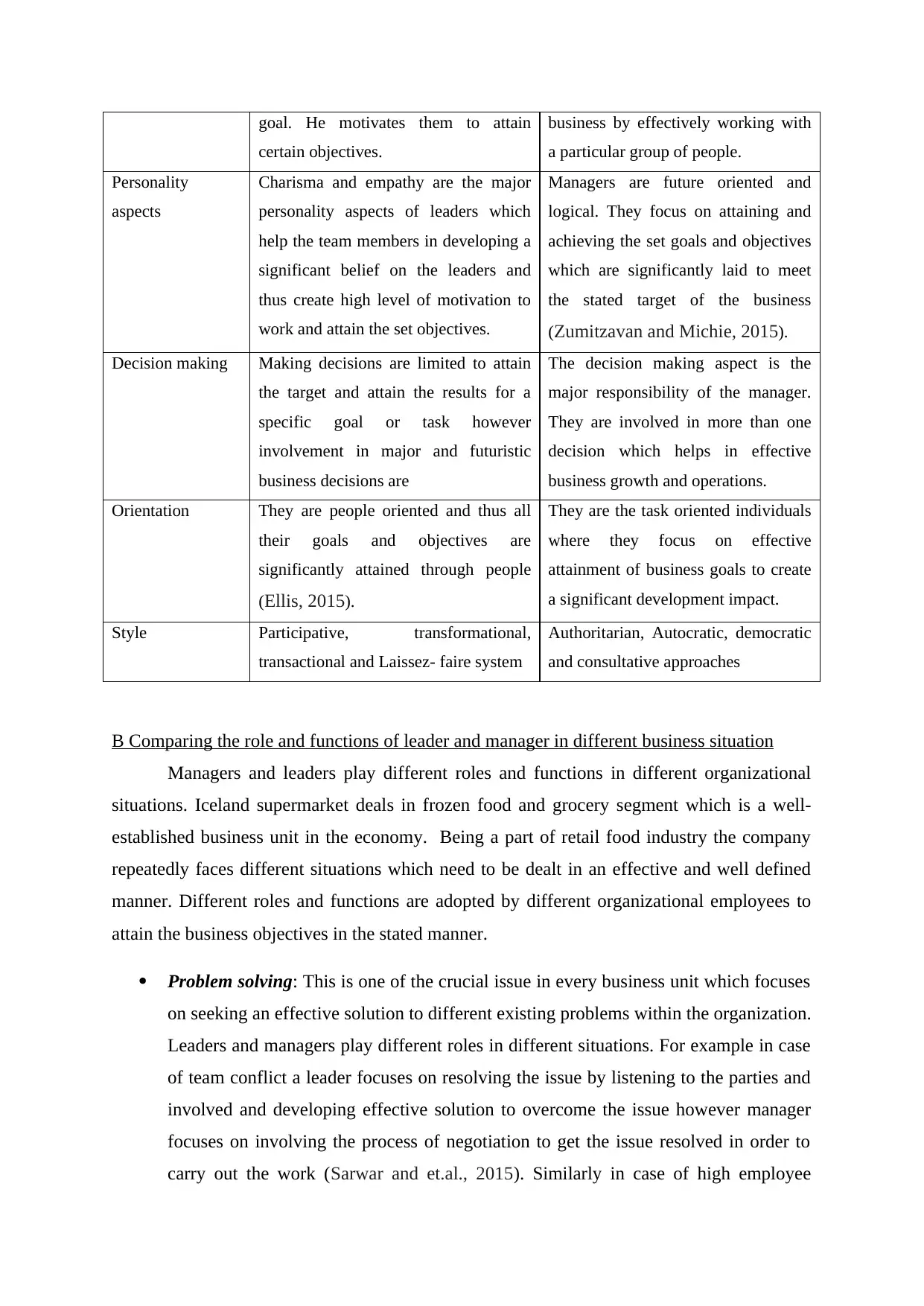
goal. He motivates them to attain
certain objectives.
business by effectively working with
a particular group of people.
Personality
aspects
Charisma and empathy are the major
personality aspects of leaders which
help the team members in developing a
significant belief on the leaders and
thus create high level of motivation to
work and attain the set objectives.
Managers are future oriented and
logical. They focus on attaining and
achieving the set goals and objectives
which are significantly laid to meet
the stated target of the business
(Zumitzavan and Michie, 2015).
Decision making Making decisions are limited to attain
the target and attain the results for a
specific goal or task however
involvement in major and futuristic
business decisions are
The decision making aspect is the
major responsibility of the manager.
They are involved in more than one
decision which helps in effective
business growth and operations.
Orientation They are people oriented and thus all
their goals and objectives are
significantly attained through people
(Ellis, 2015).
They are the task oriented individuals
where they focus on effective
attainment of business goals to create
a significant development impact.
Style Participative, transformational,
transactional and Laissez- faire system
Authoritarian, Autocratic, democratic
and consultative approaches
B Comparing the role and functions of leader and manager in different business situation
Managers and leaders play different roles and functions in different organizational
situations. Iceland supermarket deals in frozen food and grocery segment which is a well-
established business unit in the economy. Being a part of retail food industry the company
repeatedly faces different situations which need to be dealt in an effective and well defined
manner. Different roles and functions are adopted by different organizational employees to
attain the business objectives in the stated manner.
Problem solving: This is one of the crucial issue in every business unit which focuses
on seeking an effective solution to different existing problems within the organization.
Leaders and managers play different roles in different situations. For example in case
of team conflict a leader focuses on resolving the issue by listening to the parties and
involved and developing effective solution to overcome the issue however manager
focuses on involving the process of negotiation to get the issue resolved in order to
carry out the work (Sarwar and et.al., 2015). Similarly in case of high employee
certain objectives.
business by effectively working with
a particular group of people.
Personality
aspects
Charisma and empathy are the major
personality aspects of leaders which
help the team members in developing a
significant belief on the leaders and
thus create high level of motivation to
work and attain the set objectives.
Managers are future oriented and
logical. They focus on attaining and
achieving the set goals and objectives
which are significantly laid to meet
the stated target of the business
(Zumitzavan and Michie, 2015).
Decision making Making decisions are limited to attain
the target and attain the results for a
specific goal or task however
involvement in major and futuristic
business decisions are
The decision making aspect is the
major responsibility of the manager.
They are involved in more than one
decision which helps in effective
business growth and operations.
Orientation They are people oriented and thus all
their goals and objectives are
significantly attained through people
(Ellis, 2015).
They are the task oriented individuals
where they focus on effective
attainment of business goals to create
a significant development impact.
Style Participative, transformational,
transactional and Laissez- faire system
Authoritarian, Autocratic, democratic
and consultative approaches
B Comparing the role and functions of leader and manager in different business situation
Managers and leaders play different roles and functions in different organizational
situations. Iceland supermarket deals in frozen food and grocery segment which is a well-
established business unit in the economy. Being a part of retail food industry the company
repeatedly faces different situations which need to be dealt in an effective and well defined
manner. Different roles and functions are adopted by different organizational employees to
attain the business objectives in the stated manner.
Problem solving: This is one of the crucial issue in every business unit which focuses
on seeking an effective solution to different existing problems within the organization.
Leaders and managers play different roles in different situations. For example in case
of team conflict a leader focuses on resolving the issue by listening to the parties and
involved and developing effective solution to overcome the issue however manager
focuses on involving the process of negotiation to get the issue resolved in order to
carry out the work (Sarwar and et.al., 2015). Similarly in case of high employee
Paraphrase This Document
Need a fresh take? Get an instant paraphrase of this document with our AI Paraphraser
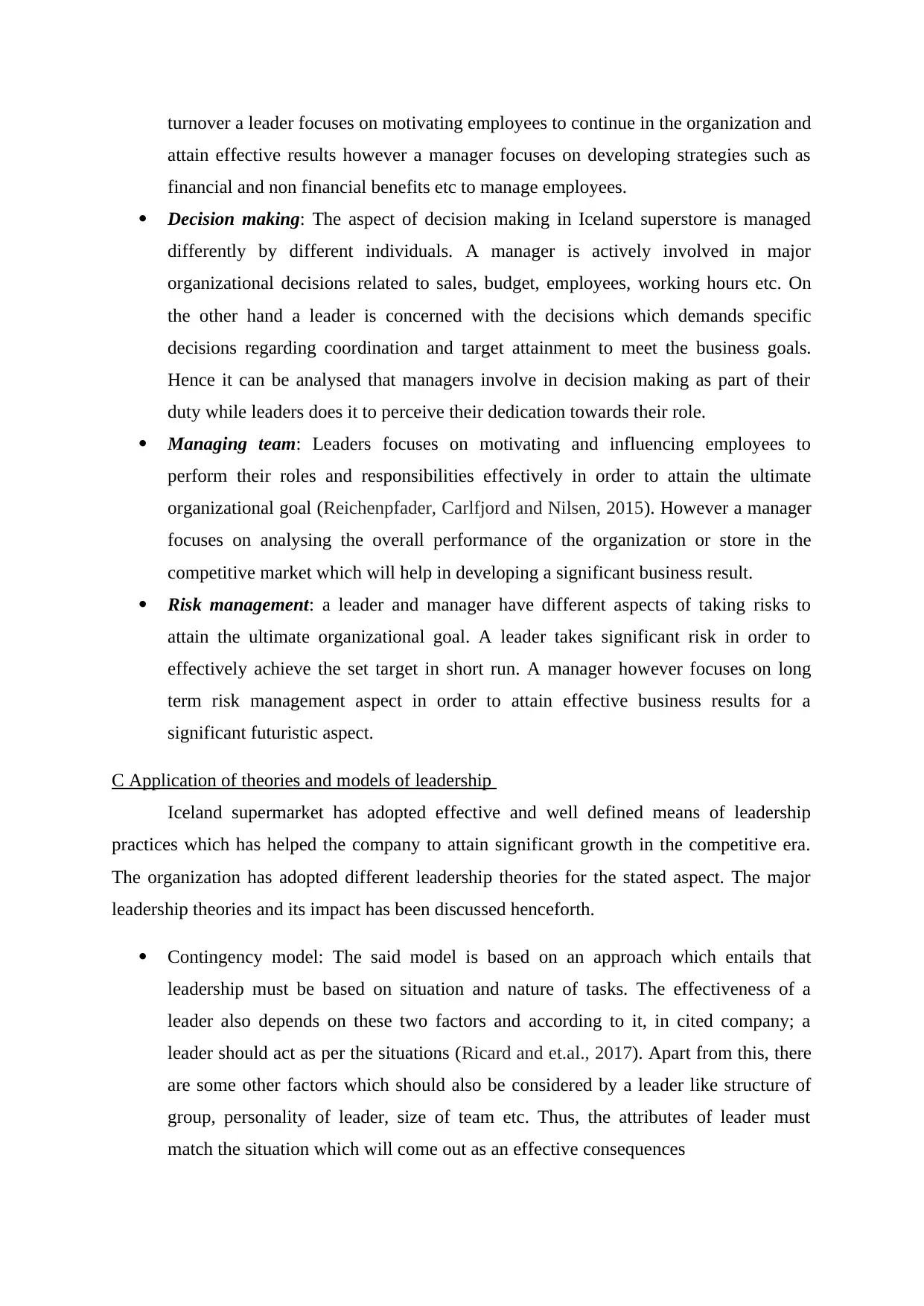
turnover a leader focuses on motivating employees to continue in the organization and
attain effective results however a manager focuses on developing strategies such as
financial and non financial benefits etc to manage employees.
Decision making: The aspect of decision making in Iceland superstore is managed
differently by different individuals. A manager is actively involved in major
organizational decisions related to sales, budget, employees, working hours etc. On
the other hand a leader is concerned with the decisions which demands specific
decisions regarding coordination and target attainment to meet the business goals.
Hence it can be analysed that managers involve in decision making as part of their
duty while leaders does it to perceive their dedication towards their role.
Managing team: Leaders focuses on motivating and influencing employees to
perform their roles and responsibilities effectively in order to attain the ultimate
organizational goal (Reichenpfader, Carlfjord and Nilsen, 2015). However a manager
focuses on analysing the overall performance of the organization or store in the
competitive market which will help in developing a significant business result.
Risk management: a leader and manager have different aspects of taking risks to
attain the ultimate organizational goal. A leader takes significant risk in order to
effectively achieve the set target in short run. A manager however focuses on long
term risk management aspect in order to attain effective business results for a
significant futuristic aspect.
C Application of theories and models of leadership
Iceland supermarket has adopted effective and well defined means of leadership
practices which has helped the company to attain significant growth in the competitive era.
The organization has adopted different leadership theories for the stated aspect. The major
leadership theories and its impact has been discussed henceforth.
Contingency model: The said model is based on an approach which entails that
leadership must be based on situation and nature of tasks. The effectiveness of a
leader also depends on these two factors and according to it, in cited company; a
leader should act as per the situations (Ricard and et.al., 2017). Apart from this, there
are some other factors which should also be considered by a leader like structure of
group, personality of leader, size of team etc. Thus, the attributes of leader must
match the situation which will come out as an effective consequences
attain effective results however a manager focuses on developing strategies such as
financial and non financial benefits etc to manage employees.
Decision making: The aspect of decision making in Iceland superstore is managed
differently by different individuals. A manager is actively involved in major
organizational decisions related to sales, budget, employees, working hours etc. On
the other hand a leader is concerned with the decisions which demands specific
decisions regarding coordination and target attainment to meet the business goals.
Hence it can be analysed that managers involve in decision making as part of their
duty while leaders does it to perceive their dedication towards their role.
Managing team: Leaders focuses on motivating and influencing employees to
perform their roles and responsibilities effectively in order to attain the ultimate
organizational goal (Reichenpfader, Carlfjord and Nilsen, 2015). However a manager
focuses on analysing the overall performance of the organization or store in the
competitive market which will help in developing a significant business result.
Risk management: a leader and manager have different aspects of taking risks to
attain the ultimate organizational goal. A leader takes significant risk in order to
effectively achieve the set target in short run. A manager however focuses on long
term risk management aspect in order to attain effective business results for a
significant futuristic aspect.
C Application of theories and models of leadership
Iceland supermarket has adopted effective and well defined means of leadership
practices which has helped the company to attain significant growth in the competitive era.
The organization has adopted different leadership theories for the stated aspect. The major
leadership theories and its impact has been discussed henceforth.
Contingency model: The said model is based on an approach which entails that
leadership must be based on situation and nature of tasks. The effectiveness of a
leader also depends on these two factors and according to it, in cited company; a
leader should act as per the situations (Ricard and et.al., 2017). Apart from this, there
are some other factors which should also be considered by a leader like structure of
group, personality of leader, size of team etc. Thus, the attributes of leader must
match the situation which will come out as an effective consequences
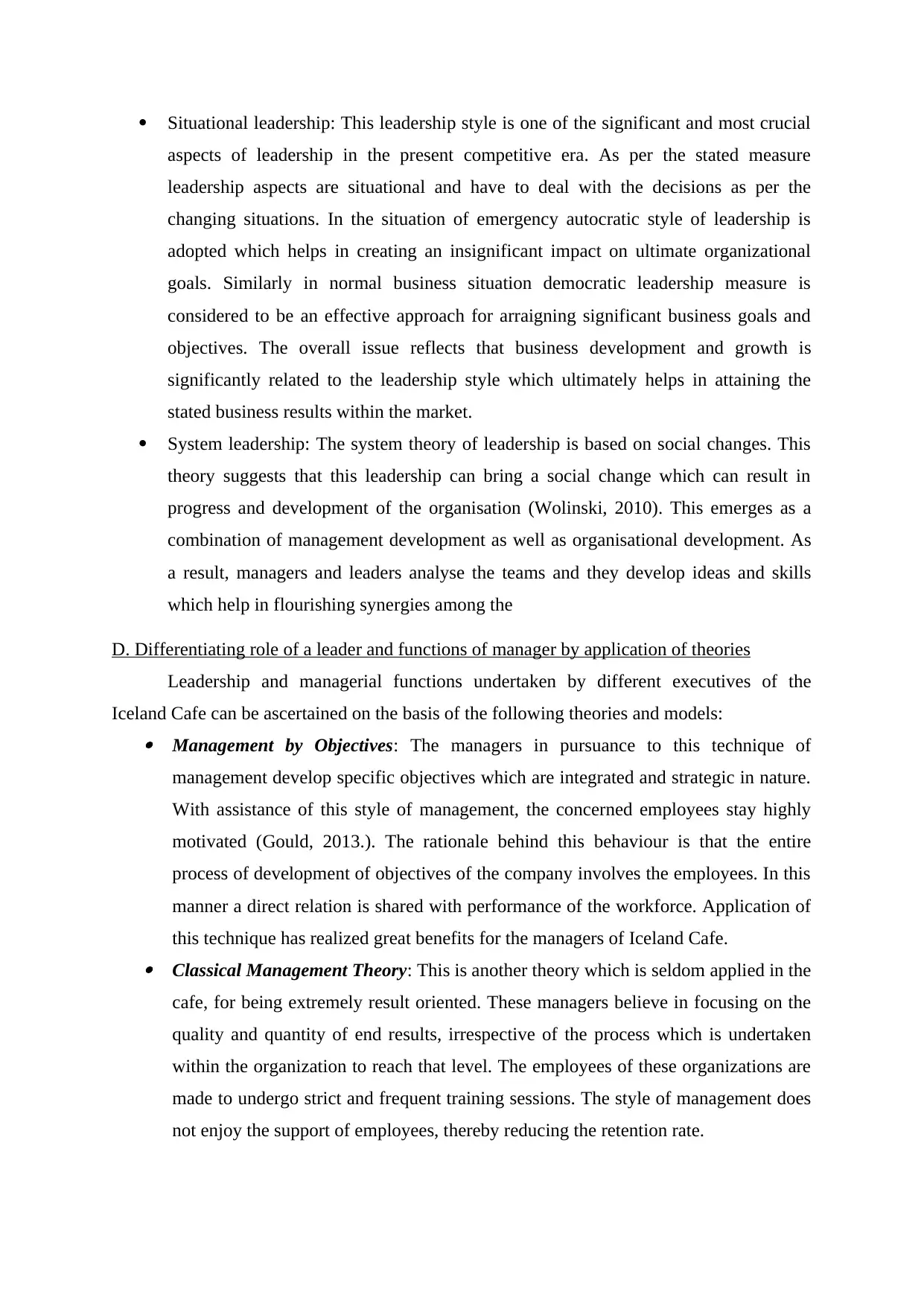
Situational leadership: This leadership style is one of the significant and most crucial
aspects of leadership in the present competitive era. As per the stated measure
leadership aspects are situational and have to deal with the decisions as per the
changing situations. In the situation of emergency autocratic style of leadership is
adopted which helps in creating an insignificant impact on ultimate organizational
goals. Similarly in normal business situation democratic leadership measure is
considered to be an effective approach for arraigning significant business goals and
objectives. The overall issue reflects that business development and growth is
significantly related to the leadership style which ultimately helps in attaining the
stated business results within the market.
System leadership: The system theory of leadership is based on social changes. This
theory suggests that this leadership can bring a social change which can result in
progress and development of the organisation (Wolinski, 2010). This emerges as a
combination of management development as well as organisational development. As
a result, managers and leaders analyse the teams and they develop ideas and skills
which help in flourishing synergies among the
D. Differentiating role of a leader and functions of manager by application of theories
Leadership and managerial functions undertaken by different executives of the
Iceland Cafe can be ascertained on the basis of the following theories and models: Management by Objectives: The managers in pursuance to this technique of
management develop specific objectives which are integrated and strategic in nature.
With assistance of this style of management, the concerned employees stay highly
motivated (Gould, 2013.). The rationale behind this behaviour is that the entire
process of development of objectives of the company involves the employees. In this
manner a direct relation is shared with performance of the workforce. Application of
this technique has realized great benefits for the managers of Iceland Cafe. Classical Management Theory: This is another theory which is seldom applied in the
cafe, for being extremely result oriented. These managers believe in focusing on the
quality and quantity of end results, irrespective of the process which is undertaken
within the organization to reach that level. The employees of these organizations are
made to undergo strict and frequent training sessions. The style of management does
not enjoy the support of employees, thereby reducing the retention rate.
aspects of leadership in the present competitive era. As per the stated measure
leadership aspects are situational and have to deal with the decisions as per the
changing situations. In the situation of emergency autocratic style of leadership is
adopted which helps in creating an insignificant impact on ultimate organizational
goals. Similarly in normal business situation democratic leadership measure is
considered to be an effective approach for arraigning significant business goals and
objectives. The overall issue reflects that business development and growth is
significantly related to the leadership style which ultimately helps in attaining the
stated business results within the market.
System leadership: The system theory of leadership is based on social changes. This
theory suggests that this leadership can bring a social change which can result in
progress and development of the organisation (Wolinski, 2010). This emerges as a
combination of management development as well as organisational development. As
a result, managers and leaders analyse the teams and they develop ideas and skills
which help in flourishing synergies among the
D. Differentiating role of a leader and functions of manager by application of theories
Leadership and managerial functions undertaken by different executives of the
Iceland Cafe can be ascertained on the basis of the following theories and models: Management by Objectives: The managers in pursuance to this technique of
management develop specific objectives which are integrated and strategic in nature.
With assistance of this style of management, the concerned employees stay highly
motivated (Gould, 2013.). The rationale behind this behaviour is that the entire
process of development of objectives of the company involves the employees. In this
manner a direct relation is shared with performance of the workforce. Application of
this technique has realized great benefits for the managers of Iceland Cafe. Classical Management Theory: This is another theory which is seldom applied in the
cafe, for being extremely result oriented. These managers believe in focusing on the
quality and quantity of end results, irrespective of the process which is undertaken
within the organization to reach that level. The employees of these organizations are
made to undergo strict and frequent training sessions. The style of management does
not enjoy the support of employees, thereby reducing the retention rate.
⊘ This is a preview!⊘
Do you want full access?
Subscribe today to unlock all pages.

Trusted by 1+ million students worldwide
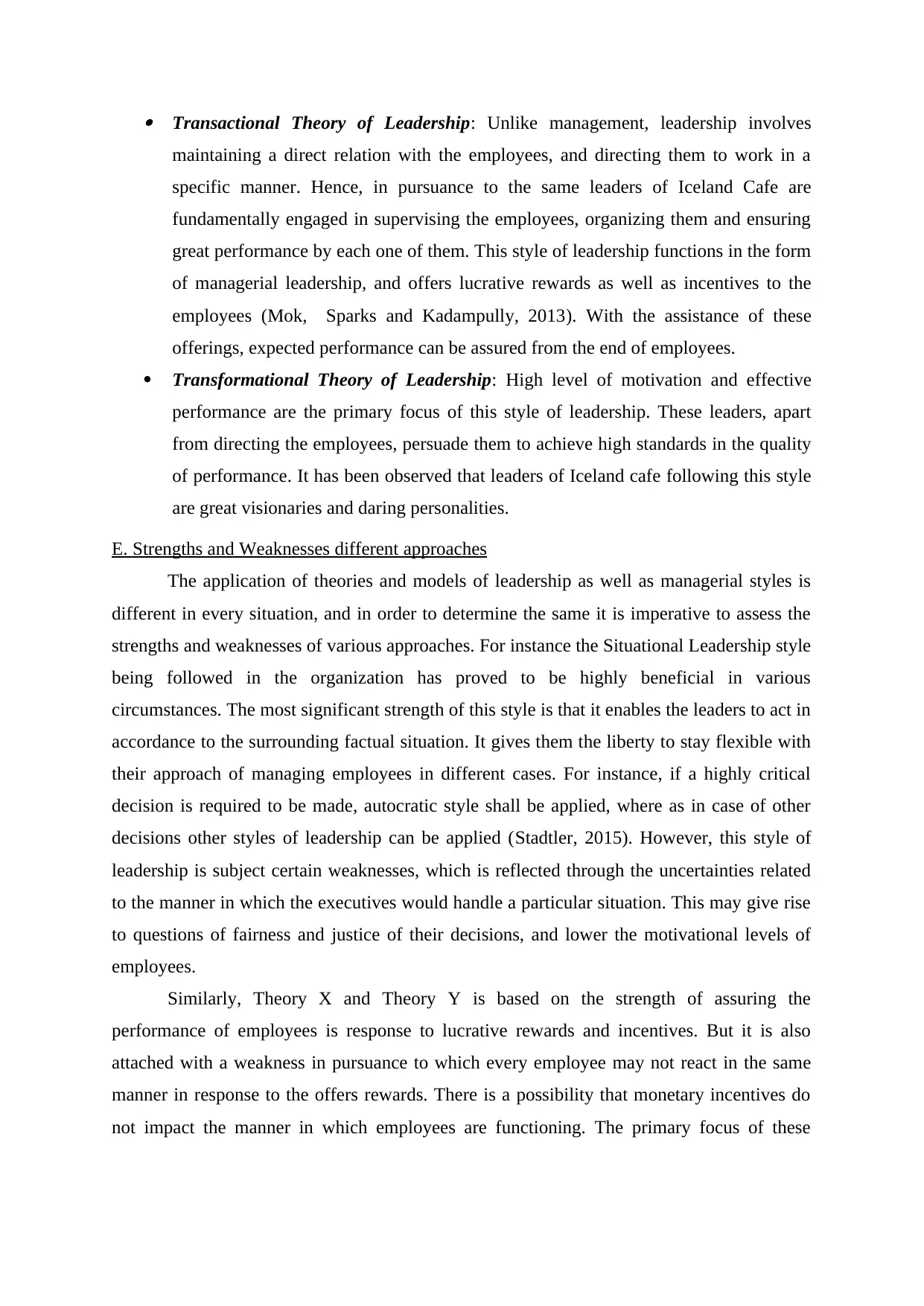
Transactional Theory of Leadership: Unlike management, leadership involves
maintaining a direct relation with the employees, and directing them to work in a
specific manner. Hence, in pursuance to the same leaders of Iceland Cafe are
fundamentally engaged in supervising the employees, organizing them and ensuring
great performance by each one of them. This style of leadership functions in the form
of managerial leadership, and offers lucrative rewards as well as incentives to the
employees (Mok, Sparks and Kadampully, 2013). With the assistance of these
offerings, expected performance can be assured from the end of employees.
Transformational Theory of Leadership: High level of motivation and effective
performance are the primary focus of this style of leadership. These leaders, apart
from directing the employees, persuade them to achieve high standards in the quality
of performance. It has been observed that leaders of Iceland cafe following this style
are great visionaries and daring personalities.
E. Strengths and Weaknesses different approaches
The application of theories and models of leadership as well as managerial styles is
different in every situation, and in order to determine the same it is imperative to assess the
strengths and weaknesses of various approaches. For instance the Situational Leadership style
being followed in the organization has proved to be highly beneficial in various
circumstances. The most significant strength of this style is that it enables the leaders to act in
accordance to the surrounding factual situation. It gives them the liberty to stay flexible with
their approach of managing employees in different cases. For instance, if a highly critical
decision is required to be made, autocratic style shall be applied, where as in case of other
decisions other styles of leadership can be applied (Stadtler, 2015). However, this style of
leadership is subject certain weaknesses, which is reflected through the uncertainties related
to the manner in which the executives would handle a particular situation. This may give rise
to questions of fairness and justice of their decisions, and lower the motivational levels of
employees.
Similarly, Theory X and Theory Y is based on the strength of assuring the
performance of employees is response to lucrative rewards and incentives. But it is also
attached with a weakness in pursuance to which every employee may not react in the same
manner in response to the offers rewards. There is a possibility that monetary incentives do
not impact the manner in which employees are functioning. The primary focus of these
maintaining a direct relation with the employees, and directing them to work in a
specific manner. Hence, in pursuance to the same leaders of Iceland Cafe are
fundamentally engaged in supervising the employees, organizing them and ensuring
great performance by each one of them. This style of leadership functions in the form
of managerial leadership, and offers lucrative rewards as well as incentives to the
employees (Mok, Sparks and Kadampully, 2013). With the assistance of these
offerings, expected performance can be assured from the end of employees.
Transformational Theory of Leadership: High level of motivation and effective
performance are the primary focus of this style of leadership. These leaders, apart
from directing the employees, persuade them to achieve high standards in the quality
of performance. It has been observed that leaders of Iceland cafe following this style
are great visionaries and daring personalities.
E. Strengths and Weaknesses different approaches
The application of theories and models of leadership as well as managerial styles is
different in every situation, and in order to determine the same it is imperative to assess the
strengths and weaknesses of various approaches. For instance the Situational Leadership style
being followed in the organization has proved to be highly beneficial in various
circumstances. The most significant strength of this style is that it enables the leaders to act in
accordance to the surrounding factual situation. It gives them the liberty to stay flexible with
their approach of managing employees in different cases. For instance, if a highly critical
decision is required to be made, autocratic style shall be applied, where as in case of other
decisions other styles of leadership can be applied (Stadtler, 2015). However, this style of
leadership is subject certain weaknesses, which is reflected through the uncertainties related
to the manner in which the executives would handle a particular situation. This may give rise
to questions of fairness and justice of their decisions, and lower the motivational levels of
employees.
Similarly, Theory X and Theory Y is based on the strength of assuring the
performance of employees is response to lucrative rewards and incentives. But it is also
attached with a weakness in pursuance to which every employee may not react in the same
manner in response to the offers rewards. There is a possibility that monetary incentives do
not impact the manner in which employees are functioning. The primary focus of these
Paraphrase This Document
Need a fresh take? Get an instant paraphrase of this document with our AI Paraphraser
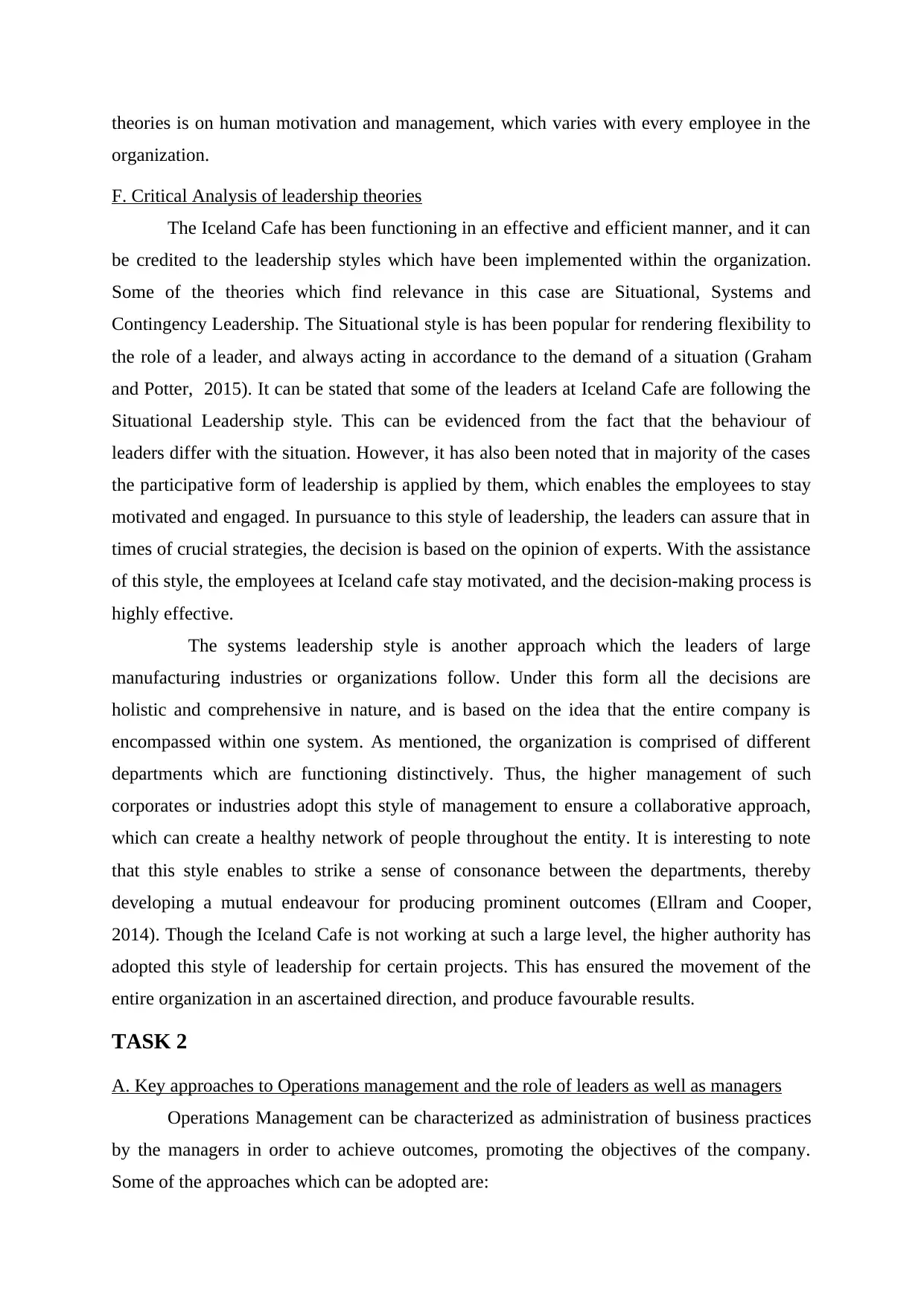
theories is on human motivation and management, which varies with every employee in the
organization.
F. Critical Analysis of leadership theories
The Iceland Cafe has been functioning in an effective and efficient manner, and it can
be credited to the leadership styles which have been implemented within the organization.
Some of the theories which find relevance in this case are Situational, Systems and
Contingency Leadership. The Situational style is has been popular for rendering flexibility to
the role of a leader, and always acting in accordance to the demand of a situation (Graham
and Potter, 2015). It can be stated that some of the leaders at Iceland Cafe are following the
Situational Leadership style. This can be evidenced from the fact that the behaviour of
leaders differ with the situation. However, it has also been noted that in majority of the cases
the participative form of leadership is applied by them, which enables the employees to stay
motivated and engaged. In pursuance to this style of leadership, the leaders can assure that in
times of crucial strategies, the decision is based on the opinion of experts. With the assistance
of this style, the employees at Iceland cafe stay motivated, and the decision-making process is
highly effective.
The systems leadership style is another approach which the leaders of large
manufacturing industries or organizations follow. Under this form all the decisions are
holistic and comprehensive in nature, and is based on the idea that the entire company is
encompassed within one system. As mentioned, the organization is comprised of different
departments which are functioning distinctively. Thus, the higher management of such
corporates or industries adopt this style of management to ensure a collaborative approach,
which can create a healthy network of people throughout the entity. It is interesting to note
that this style enables to strike a sense of consonance between the departments, thereby
developing a mutual endeavour for producing prominent outcomes (Ellram and Cooper,
2014). Though the Iceland Cafe is not working at such a large level, the higher authority has
adopted this style of leadership for certain projects. This has ensured the movement of the
entire organization in an ascertained direction, and produce favourable results.
TASK 2
A. Key approaches to Operations management and the role of leaders as well as managers
Operations Management can be characterized as administration of business practices
by the managers in order to achieve outcomes, promoting the objectives of the company.
Some of the approaches which can be adopted are:
organization.
F. Critical Analysis of leadership theories
The Iceland Cafe has been functioning in an effective and efficient manner, and it can
be credited to the leadership styles which have been implemented within the organization.
Some of the theories which find relevance in this case are Situational, Systems and
Contingency Leadership. The Situational style is has been popular for rendering flexibility to
the role of a leader, and always acting in accordance to the demand of a situation (Graham
and Potter, 2015). It can be stated that some of the leaders at Iceland Cafe are following the
Situational Leadership style. This can be evidenced from the fact that the behaviour of
leaders differ with the situation. However, it has also been noted that in majority of the cases
the participative form of leadership is applied by them, which enables the employees to stay
motivated and engaged. In pursuance to this style of leadership, the leaders can assure that in
times of crucial strategies, the decision is based on the opinion of experts. With the assistance
of this style, the employees at Iceland cafe stay motivated, and the decision-making process is
highly effective.
The systems leadership style is another approach which the leaders of large
manufacturing industries or organizations follow. Under this form all the decisions are
holistic and comprehensive in nature, and is based on the idea that the entire company is
encompassed within one system. As mentioned, the organization is comprised of different
departments which are functioning distinctively. Thus, the higher management of such
corporates or industries adopt this style of management to ensure a collaborative approach,
which can create a healthy network of people throughout the entity. It is interesting to note
that this style enables to strike a sense of consonance between the departments, thereby
developing a mutual endeavour for producing prominent outcomes (Ellram and Cooper,
2014). Though the Iceland Cafe is not working at such a large level, the higher authority has
adopted this style of leadership for certain projects. This has ensured the movement of the
entire organization in an ascertained direction, and produce favourable results.
TASK 2
A. Key approaches to Operations management and the role of leaders as well as managers
Operations Management can be characterized as administration of business practices
by the managers in order to achieve outcomes, promoting the objectives of the company.
Some of the approaches which can be adopted are:
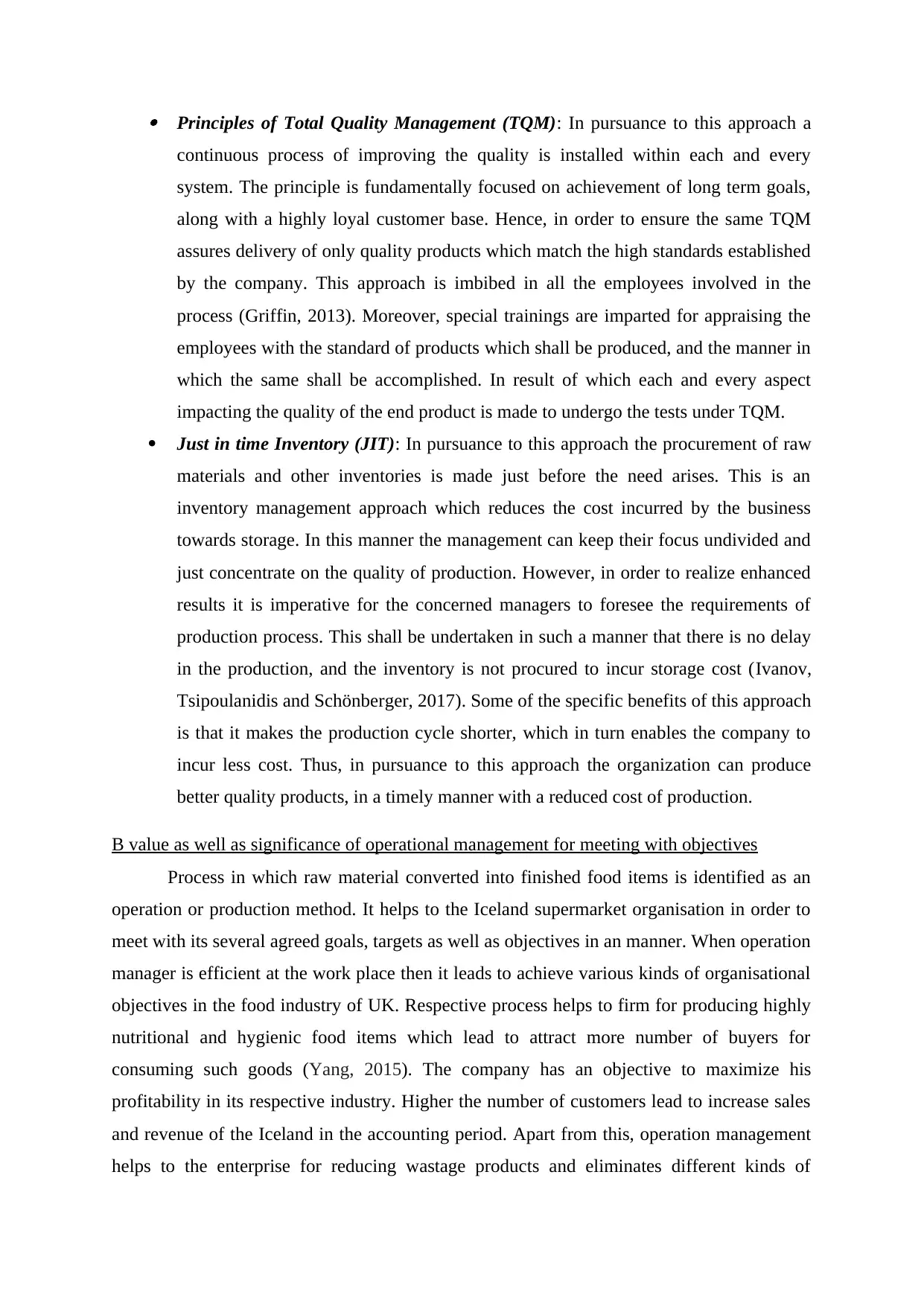
Principles of Total Quality Management (TQM): In pursuance to this approach a
continuous process of improving the quality is installed within each and every
system. The principle is fundamentally focused on achievement of long term goals,
along with a highly loyal customer base. Hence, in order to ensure the same TQM
assures delivery of only quality products which match the high standards established
by the company. This approach is imbibed in all the employees involved in the
process (Griffin, 2013). Moreover, special trainings are imparted for appraising the
employees with the standard of products which shall be produced, and the manner in
which the same shall be accomplished. In result of which each and every aspect
impacting the quality of the end product is made to undergo the tests under TQM.
Just in time Inventory (JIT): In pursuance to this approach the procurement of raw
materials and other inventories is made just before the need arises. This is an
inventory management approach which reduces the cost incurred by the business
towards storage. In this manner the management can keep their focus undivided and
just concentrate on the quality of production. However, in order to realize enhanced
results it is imperative for the concerned managers to foresee the requirements of
production process. This shall be undertaken in such a manner that there is no delay
in the production, and the inventory is not procured to incur storage cost (Ivanov,
Tsipoulanidis and Schönberger, 2017). Some of the specific benefits of this approach
is that it makes the production cycle shorter, which in turn enables the company to
incur less cost. Thus, in pursuance to this approach the organization can produce
better quality products, in a timely manner with a reduced cost of production.
B value as well as significance of operational management for meeting with objectives
Process in which raw material converted into finished food items is identified as an
operation or production method. It helps to the Iceland supermarket organisation in order to
meet with its several agreed goals, targets as well as objectives in an manner. When operation
manager is efficient at the work place then it leads to achieve various kinds of organisational
objectives in the food industry of UK. Respective process helps to firm for producing highly
nutritional and hygienic food items which lead to attract more number of buyers for
consuming such goods (Yang, 2015). The company has an objective to maximize his
profitability in its respective industry. Higher the number of customers lead to increase sales
and revenue of the Iceland in the accounting period. Apart from this, operation management
helps to the enterprise for reducing wastage products and eliminates different kinds of
continuous process of improving the quality is installed within each and every
system. The principle is fundamentally focused on achievement of long term goals,
along with a highly loyal customer base. Hence, in order to ensure the same TQM
assures delivery of only quality products which match the high standards established
by the company. This approach is imbibed in all the employees involved in the
process (Griffin, 2013). Moreover, special trainings are imparted for appraising the
employees with the standard of products which shall be produced, and the manner in
which the same shall be accomplished. In result of which each and every aspect
impacting the quality of the end product is made to undergo the tests under TQM.
Just in time Inventory (JIT): In pursuance to this approach the procurement of raw
materials and other inventories is made just before the need arises. This is an
inventory management approach which reduces the cost incurred by the business
towards storage. In this manner the management can keep their focus undivided and
just concentrate on the quality of production. However, in order to realize enhanced
results it is imperative for the concerned managers to foresee the requirements of
production process. This shall be undertaken in such a manner that there is no delay
in the production, and the inventory is not procured to incur storage cost (Ivanov,
Tsipoulanidis and Schönberger, 2017). Some of the specific benefits of this approach
is that it makes the production cycle shorter, which in turn enables the company to
incur less cost. Thus, in pursuance to this approach the organization can produce
better quality products, in a timely manner with a reduced cost of production.
B value as well as significance of operational management for meeting with objectives
Process in which raw material converted into finished food items is identified as an
operation or production method. It helps to the Iceland supermarket organisation in order to
meet with its several agreed goals, targets as well as objectives in an manner. When operation
manager is efficient at the work place then it leads to achieve various kinds of organisational
objectives in the food industry of UK. Respective process helps to firm for producing highly
nutritional and hygienic food items which lead to attract more number of buyers for
consuming such goods (Yang, 2015). The company has an objective to maximize his
profitability in its respective industry. Higher the number of customers lead to increase sales
and revenue of the Iceland in the accounting period. Apart from this, operation management
helps to the enterprise for reducing wastage products and eliminates different kinds of
⊘ This is a preview!⊘
Do you want full access?
Subscribe today to unlock all pages.

Trusted by 1+ million students worldwide
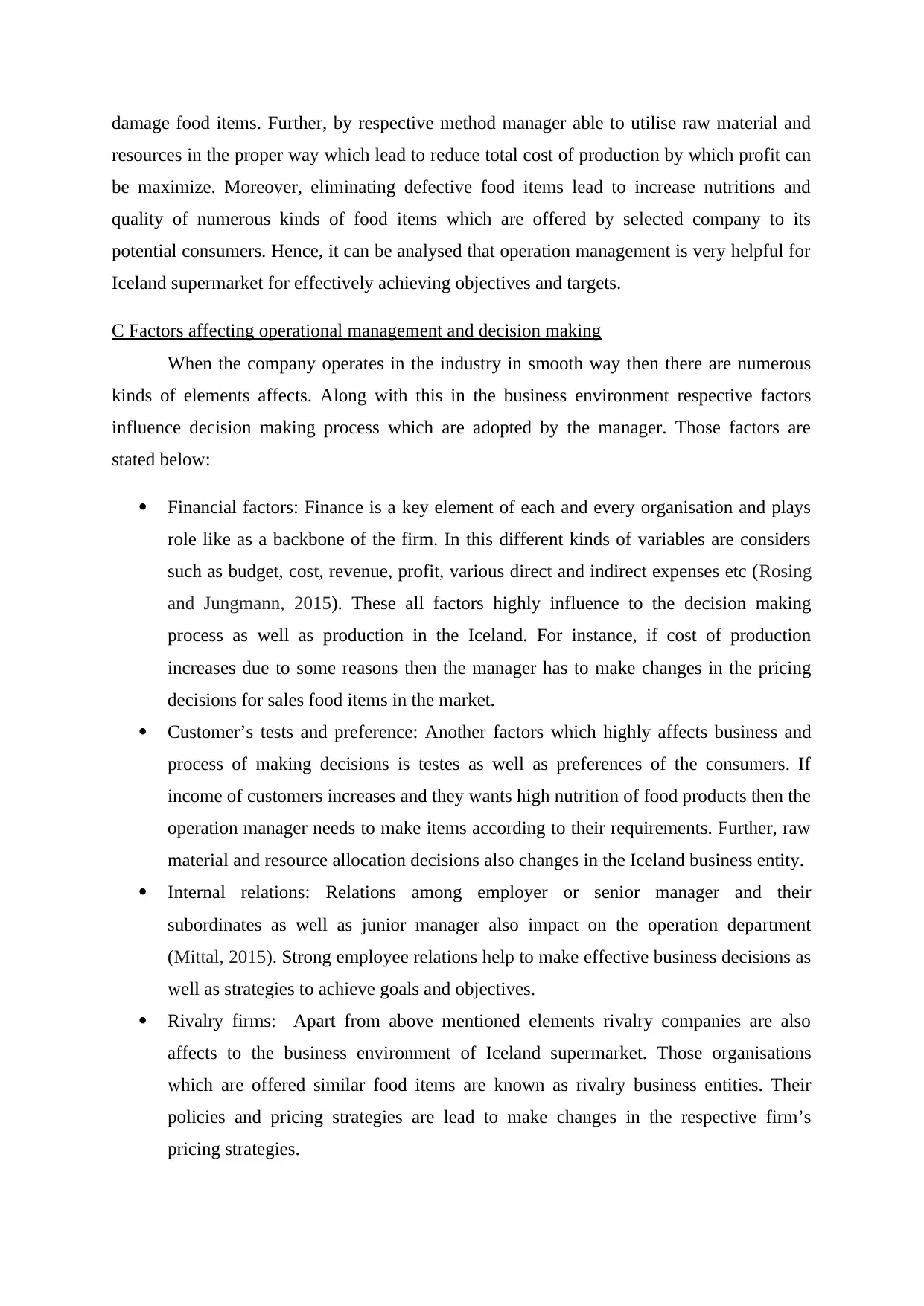
damage food items. Further, by respective method manager able to utilise raw material and
resources in the proper way which lead to reduce total cost of production by which profit can
be maximize. Moreover, eliminating defective food items lead to increase nutritions and
quality of numerous kinds of food items which are offered by selected company to its
potential consumers. Hence, it can be analysed that operation management is very helpful for
Iceland supermarket for effectively achieving objectives and targets.
C Factors affecting operational management and decision making
When the company operates in the industry in smooth way then there are numerous
kinds of elements affects. Along with this in the business environment respective factors
influence decision making process which are adopted by the manager. Those factors are
stated below:
Financial factors: Finance is a key element of each and every organisation and plays
role like as a backbone of the firm. In this different kinds of variables are considers
such as budget, cost, revenue, profit, various direct and indirect expenses etc (Rosing
and Jungmann, 2015). These all factors highly influence to the decision making
process as well as production in the Iceland. For instance, if cost of production
increases due to some reasons then the manager has to make changes in the pricing
decisions for sales food items in the market.
Customer’s tests and preference: Another factors which highly affects business and
process of making decisions is testes as well as preferences of the consumers. If
income of customers increases and they wants high nutrition of food products then the
operation manager needs to make items according to their requirements. Further, raw
material and resource allocation decisions also changes in the Iceland business entity.
Internal relations: Relations among employer or senior manager and their
subordinates as well as junior manager also impact on the operation department
(Mittal, 2015). Strong employee relations help to make effective business decisions as
well as strategies to achieve goals and objectives.
Rivalry firms: Apart from above mentioned elements rivalry companies are also
affects to the business environment of Iceland supermarket. Those organisations
which are offered similar food items are known as rivalry business entities. Their
policies and pricing strategies are lead to make changes in the respective firm’s
pricing strategies.
resources in the proper way which lead to reduce total cost of production by which profit can
be maximize. Moreover, eliminating defective food items lead to increase nutritions and
quality of numerous kinds of food items which are offered by selected company to its
potential consumers. Hence, it can be analysed that operation management is very helpful for
Iceland supermarket for effectively achieving objectives and targets.
C Factors affecting operational management and decision making
When the company operates in the industry in smooth way then there are numerous
kinds of elements affects. Along with this in the business environment respective factors
influence decision making process which are adopted by the manager. Those factors are
stated below:
Financial factors: Finance is a key element of each and every organisation and plays
role like as a backbone of the firm. In this different kinds of variables are considers
such as budget, cost, revenue, profit, various direct and indirect expenses etc (Rosing
and Jungmann, 2015). These all factors highly influence to the decision making
process as well as production in the Iceland. For instance, if cost of production
increases due to some reasons then the manager has to make changes in the pricing
decisions for sales food items in the market.
Customer’s tests and preference: Another factors which highly affects business and
process of making decisions is testes as well as preferences of the consumers. If
income of customers increases and they wants high nutrition of food products then the
operation manager needs to make items according to their requirements. Further, raw
material and resource allocation decisions also changes in the Iceland business entity.
Internal relations: Relations among employer or senior manager and their
subordinates as well as junior manager also impact on the operation department
(Mittal, 2015). Strong employee relations help to make effective business decisions as
well as strategies to achieve goals and objectives.
Rivalry firms: Apart from above mentioned elements rivalry companies are also
affects to the business environment of Iceland supermarket. Those organisations
which are offered similar food items are known as rivalry business entities. Their
policies and pricing strategies are lead to make changes in the respective firm’s
pricing strategies.
Paraphrase This Document
Need a fresh take? Get an instant paraphrase of this document with our AI Paraphraser
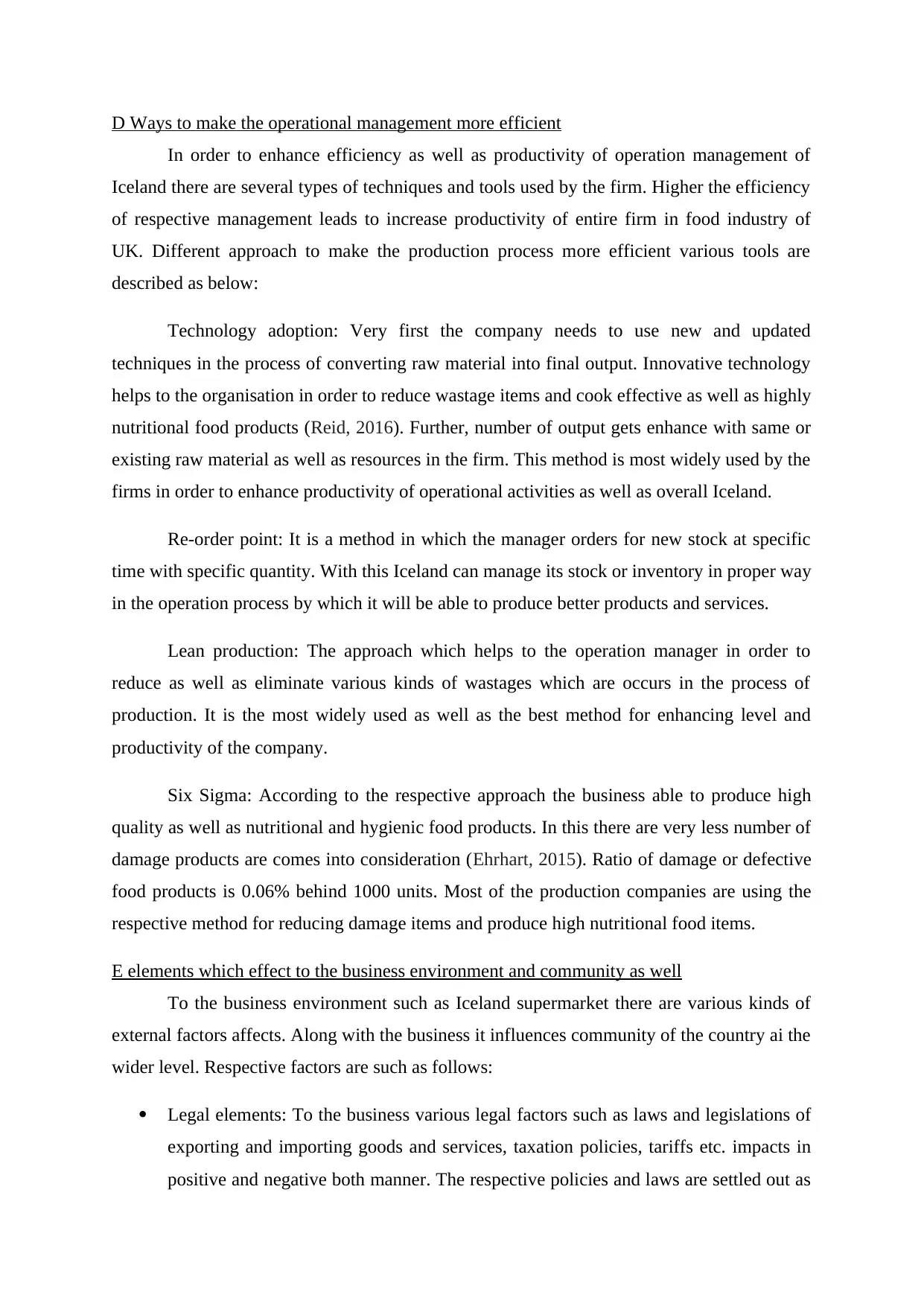
D Ways to make the operational management more efficient
In order to enhance efficiency as well as productivity of operation management of
Iceland there are several types of techniques and tools used by the firm. Higher the efficiency
of respective management leads to increase productivity of entire firm in food industry of
UK. Different approach to make the production process more efficient various tools are
described as below:
Technology adoption: Very first the company needs to use new and updated
techniques in the process of converting raw material into final output. Innovative technology
helps to the organisation in order to reduce wastage items and cook effective as well as highly
nutritional food products (Reid, 2016). Further, number of output gets enhance with same or
existing raw material as well as resources in the firm. This method is most widely used by the
firms in order to enhance productivity of operational activities as well as overall Iceland.
Re-order point: It is a method in which the manager orders for new stock at specific
time with specific quantity. With this Iceland can manage its stock or inventory in proper way
in the operation process by which it will be able to produce better products and services.
Lean production: The approach which helps to the operation manager in order to
reduce as well as eliminate various kinds of wastages which are occurs in the process of
production. It is the most widely used as well as the best method for enhancing level and
productivity of the company.
Six Sigma: According to the respective approach the business able to produce high
quality as well as nutritional and hygienic food products. In this there are very less number of
damage products are comes into consideration (Ehrhart, 2015). Ratio of damage or defective
food products is 0.06% behind 1000 units. Most of the production companies are using the
respective method for reducing damage items and produce high nutritional food items.
E elements which effect to the business environment and community as well
To the business environment such as Iceland supermarket there are various kinds of
external factors affects. Along with the business it influences community of the country ai the
wider level. Respective factors are such as follows:
Legal elements: To the business various legal factors such as laws and legislations of
exporting and importing goods and services, taxation policies, tariffs etc. impacts in
positive and negative both manner. The respective policies and laws are settled out as
In order to enhance efficiency as well as productivity of operation management of
Iceland there are several types of techniques and tools used by the firm. Higher the efficiency
of respective management leads to increase productivity of entire firm in food industry of
UK. Different approach to make the production process more efficient various tools are
described as below:
Technology adoption: Very first the company needs to use new and updated
techniques in the process of converting raw material into final output. Innovative technology
helps to the organisation in order to reduce wastage items and cook effective as well as highly
nutritional food products (Reid, 2016). Further, number of output gets enhance with same or
existing raw material as well as resources in the firm. This method is most widely used by the
firms in order to enhance productivity of operational activities as well as overall Iceland.
Re-order point: It is a method in which the manager orders for new stock at specific
time with specific quantity. With this Iceland can manage its stock or inventory in proper way
in the operation process by which it will be able to produce better products and services.
Lean production: The approach which helps to the operation manager in order to
reduce as well as eliminate various kinds of wastages which are occurs in the process of
production. It is the most widely used as well as the best method for enhancing level and
productivity of the company.
Six Sigma: According to the respective approach the business able to produce high
quality as well as nutritional and hygienic food products. In this there are very less number of
damage products are comes into consideration (Ehrhart, 2015). Ratio of damage or defective
food products is 0.06% behind 1000 units. Most of the production companies are using the
respective method for reducing damage items and produce high nutritional food items.
E elements which effect to the business environment and community as well
To the business environment such as Iceland supermarket there are various kinds of
external factors affects. Along with the business it influences community of the country ai the
wider level. Respective factors are such as follows:
Legal elements: To the business various legal factors such as laws and legislations of
exporting and importing goods and services, taxation policies, tariffs etc. impacts in
positive and negative both manner. The respective policies and laws are settled out as
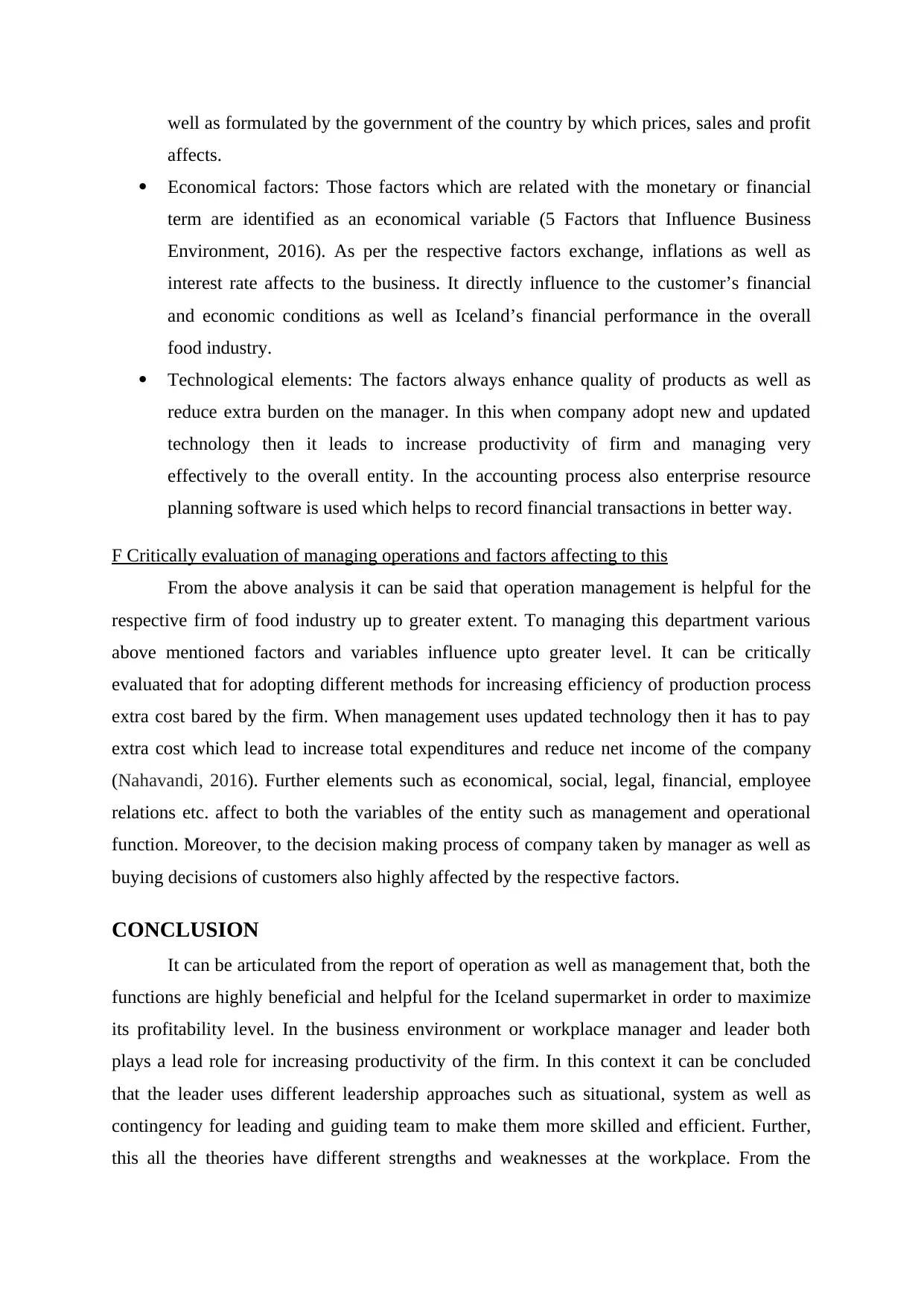
well as formulated by the government of the country by which prices, sales and profit
affects.
Economical factors: Those factors which are related with the monetary or financial
term are identified as an economical variable (5 Factors that Influence Business
Environment, 2016). As per the respective factors exchange, inflations as well as
interest rate affects to the business. It directly influence to the customer’s financial
and economic conditions as well as Iceland’s financial performance in the overall
food industry.
Technological elements: The factors always enhance quality of products as well as
reduce extra burden on the manager. In this when company adopt new and updated
technology then it leads to increase productivity of firm and managing very
effectively to the overall entity. In the accounting process also enterprise resource
planning software is used which helps to record financial transactions in better way.
F Critically evaluation of managing operations and factors affecting to this
From the above analysis it can be said that operation management is helpful for the
respective firm of food industry up to greater extent. To managing this department various
above mentioned factors and variables influence upto greater level. It can be critically
evaluated that for adopting different methods for increasing efficiency of production process
extra cost bared by the firm. When management uses updated technology then it has to pay
extra cost which lead to increase total expenditures and reduce net income of the company
(Nahavandi, 2016). Further elements such as economical, social, legal, financial, employee
relations etc. affect to both the variables of the entity such as management and operational
function. Moreover, to the decision making process of company taken by manager as well as
buying decisions of customers also highly affected by the respective factors.
CONCLUSION
It can be articulated from the report of operation as well as management that, both the
functions are highly beneficial and helpful for the Iceland supermarket in order to maximize
its profitability level. In the business environment or workplace manager and leader both
plays a lead role for increasing productivity of the firm. In this context it can be concluded
that the leader uses different leadership approaches such as situational, system as well as
contingency for leading and guiding team to make them more skilled and efficient. Further,
this all the theories have different strengths and weaknesses at the workplace. From the
affects.
Economical factors: Those factors which are related with the monetary or financial
term are identified as an economical variable (5 Factors that Influence Business
Environment, 2016). As per the respective factors exchange, inflations as well as
interest rate affects to the business. It directly influence to the customer’s financial
and economic conditions as well as Iceland’s financial performance in the overall
food industry.
Technological elements: The factors always enhance quality of products as well as
reduce extra burden on the manager. In this when company adopt new and updated
technology then it leads to increase productivity of firm and managing very
effectively to the overall entity. In the accounting process also enterprise resource
planning software is used which helps to record financial transactions in better way.
F Critically evaluation of managing operations and factors affecting to this
From the above analysis it can be said that operation management is helpful for the
respective firm of food industry up to greater extent. To managing this department various
above mentioned factors and variables influence upto greater level. It can be critically
evaluated that for adopting different methods for increasing efficiency of production process
extra cost bared by the firm. When management uses updated technology then it has to pay
extra cost which lead to increase total expenditures and reduce net income of the company
(Nahavandi, 2016). Further elements such as economical, social, legal, financial, employee
relations etc. affect to both the variables of the entity such as management and operational
function. Moreover, to the decision making process of company taken by manager as well as
buying decisions of customers also highly affected by the respective factors.
CONCLUSION
It can be articulated from the report of operation as well as management that, both the
functions are highly beneficial and helpful for the Iceland supermarket in order to maximize
its profitability level. In the business environment or workplace manager and leader both
plays a lead role for increasing productivity of the firm. In this context it can be concluded
that the leader uses different leadership approaches such as situational, system as well as
contingency for leading and guiding team to make them more skilled and efficient. Further,
this all the theories have different strengths and weaknesses at the workplace. From the
⊘ This is a preview!⊘
Do you want full access?
Subscribe today to unlock all pages.

Trusted by 1+ million students worldwide
1 out of 15
Related Documents
Your All-in-One AI-Powered Toolkit for Academic Success.
+13062052269
info@desklib.com
Available 24*7 on WhatsApp / Email
![[object Object]](/_next/static/media/star-bottom.7253800d.svg)
Unlock your academic potential
Copyright © 2020–2026 A2Z Services. All Rights Reserved. Developed and managed by ZUCOL.




